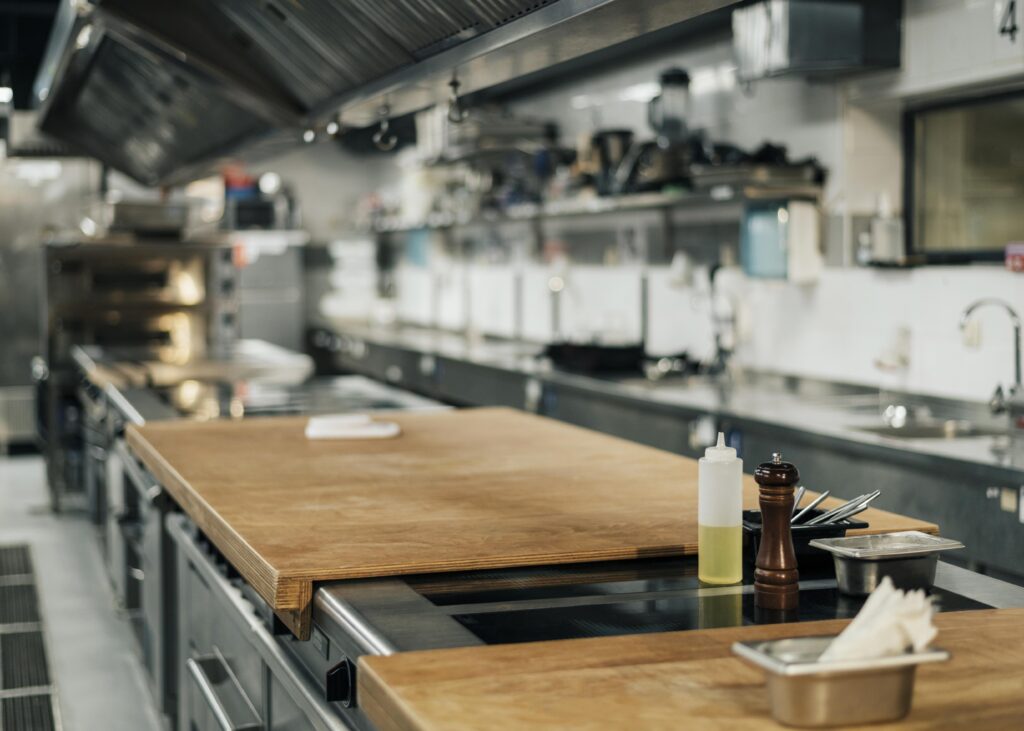
The United Arab Emirates has established itself as a global culinary destination, with thousands of commercial kitchens operating across restaurants, hotels, catering facilities, and food service establishments. However, with this thriving food industry comes significant responsibility for safety and compliance. One critical component that every commercial kitchen in the UAE must prioritize is an Electrostatic Precipitator (ESP) system.
Commercial kitchen fires pose serious threats to businesses, employees, and customers. The high-temperature cooking processes, grease accumulation, and constant heat sources create an environment where fire hazards are ever-present. This comprehensive guide explores why ESP systems are not just recommended but essential for every commercial kitchen operating in the UAE.
Understanding ESP Systems in Commercial Kitchens
An Electrostatic Precipitator system is a sophisticated fire suppression and grease management solution specifically designed for commercial kitchen environments. These systems work by using electrical charges to remove grease particles, smoke, and other contaminants from kitchen exhaust air before it exits the building.
The ESP technology operates on the principle of electrostatic attraction. As contaminated air passes through the system, particles receive an electrical charge and are then attracted to collection plates with opposite charges. This process effectively removes up to 95% of grease particles and significantly reduces fire risks associated with grease buildup in exhaust systems.
Unlike traditional kitchen hood systems that merely capture and redirect grease-laden air, ESP systems actively clean the exhaust stream, providing superior protection and environmental benefits.
The Legal Landscape: UAE Fire Safety Regulations
The UAE maintains strict fire safety regulations for commercial establishments, particularly those in the food service industry. The UAE Fire and Life Safety Code, along with local municipality requirements, mandates specific fire suppression systems for commercial kitchens.
Dubai Municipality, Abu Dhabi Municipality, and other local authorities require commercial kitchens to implement approved fire suppression systems that meet international standards. These regulations are not merely suggestions but legal requirements that businesses must fulfill to obtain and maintain operating licenses.
The Civil Defence authorities conduct regular inspections of commercial kitchens to ensure compliance with fire safety regulations. Establishments that fail to meet these requirements face penalties, temporary closures, or license revocations. ESP systems help businesses meet these stringent requirements while providing superior protection compared to basic fire suppression alternatives.
Furthermore, insurance companies in the UAE often require commercial kitchens to install approved fire suppression systems as a condition of coverage. ESP systems not only meet these requirements but may also qualify businesses for reduced insurance premiums due to their enhanced safety features.
Fire Risk Factors in Commercial Kitchens
Commercial kitchens present unique fire hazards that require specialized protection systems. Understanding these risks highlights why ESP systems are crucial for safe kitchen operations.
Grease Accumulation Dangers
Cooking processes generate significant amounts of grease vapor that travels through exhaust systems. Over time, this grease accumulates on ductwork walls, creating highly flammable deposits. Traditional cleaning methods often cannot reach all areas where grease accumulates, leaving dangerous buildup that can ignite with minimal heat exposure.
Grease fires spread rapidly and burn at extremely high temperatures, making them difficult to extinguish with conventional methods. The confined spaces of kitchen exhaust systems allow fires to spread quickly throughout the ventilation network, potentially reaching roof areas and adjacent buildings.
High-Temperature Cooking Equipment
Commercial kitchens utilize high-powered cooking equipment that operates at elevated temperatures throughout operating hours. Grills, fryers, ranges, and other appliances generate intense heat that can easily ignite accumulated grease or other combustible materials.
The constant heat exposure in commercial kitchens creates thermal stress on building materials and increases the likelihood of ignition sources. Even minor equipment malfunctions can create sparks or excessive heat that triggers fires in grease-contaminated environments.
Human Error Factors
Busy kitchen environments increase the probability of human errors that can lead to fire incidents. Staff may inadvertently leave equipment unattended, fail to maintain proper cleaning schedules, or make operational mistakes that create fire hazards.
The fast-paced nature of commercial food service means that safety protocols may be overlooked during peak operating periods. ESP systems provide continuous protection that operates independently of human intervention, ensuring consistent fire prevention regardless of operational pressures.
How ESP Systems Provide Superior Protection
ESP systems offer multiple layers of protection that address the specific fire risks present in commercial kitchens. Their comprehensive approach to fire prevention sets them apart from basic suppression systems.
Continuous Grease Removal
The primary advantage of ESP systems is their ability to continuously remove grease particles from kitchen exhaust air. By eliminating grease before it can accumulate in ductwork, these systems address the root cause of most kitchen fires rather than simply responding to existing fires.
This proactive approach significantly reduces the fuel load available for potential fires, creating a much safer operating environment. The continuous cleaning action means that grease buildup never reaches dangerous levels, even during heavy cooking periods.
Automatic Operation and Monitoring
Modern ESP systems operate automatically and include sophisticated monitoring capabilities that provide real-time feedback on system performance. Sensors detect when cleaning cycles are needed and alert operators to any maintenance requirements.
This automation ensures that protection remains consistent without relying on manual intervention or staff remembering to perform maintenance tasks. The monitoring systems can also integrate with building management systems to provide centralized oversight of kitchen safety status.
Integration with Fire Suppression
ESP systems can integrate seamlessly with traditional fire suppression systems to provide comprehensive protection. While the ESP system prevents most fires by removing combustible materials, backup suppression systems provide additional protection in the unlikely event of a fire occurrence.
This layered approach ensures that commercial kitchens have multiple levels of protection, meeting and exceeding safety requirements while providing peace of mind for business owners and operators.
Environmental and Economic Benefits
Beyond fire protection, ESP systems provide significant environmental and economic advantages that make them attractive investments for commercial kitchen operators.
Air Quality Improvement
ESP systems dramatically improve indoor and outdoor air quality by removing grease particles, smoke, and odors from kitchen exhaust. This creates more comfortable working conditions for kitchen staff and reduces the impact on neighboring properties.
Improved air quality can lead to better employee health and satisfaction, potentially reducing sick days and turnover rates. Additionally, reduced odor emissions help maintain positive relationships with neighboring businesses and residents.
Energy Efficiency Gains
By removing grease and particulates from exhaust air, ESP systems allow kitchen ventilation systems to operate more efficiently. Clean ductwork maintains better airflow, reducing the energy required to achieve proper ventilation rates.
The improved efficiency can result in significant energy cost savings over time, helping to offset the initial investment in ESP system installation. Many businesses report noticeable reductions in utility costs after implementing ESP systems.
Reduced Maintenance Requirements
Traditional kitchen exhaust systems require frequent and expensive cleaning to remove grease buildup. ESP systems dramatically reduce the frequency of these cleaning requirements, as the continuous grease removal prevents significant accumulation.
The reduced maintenance needs translate to lower operational costs and less business disruption from cleaning activities. Kitchen operations can continue with minimal interruption, maintaining productivity and revenue generation.
Choosing the Right ESP System
Selecting an appropriate ESP system requires careful consideration of kitchen size, cooking volume, and specific operational requirements. Professional assessment ensures that the chosen system provides adequate protection while meeting regulatory requirements.
System Sizing Considerations
Proper ESP system sizing depends on factors including kitchen square footage, number of cooking appliances, and peak cooking volumes. Undersized systems may not provide adequate protection, while oversized systems represent unnecessary capital expenditure.
Professional engineers can perform load calculations and airflow analyses to determine optimal system specifications for each application. This technical approach ensures that the selected system provides reliable protection while optimizing cost efficiency.
Installation and Maintenance Requirements
ESP system installation requires specialized knowledge and adherence to manufacturer specifications. Proper installation is crucial for system performance and regulatory compliance.
Ongoing maintenance requirements vary by system type and usage levels, but generally involve periodic cleaning of collection plates and monitoring of electrical components. Establishing maintenance contracts with qualified service providers ensures consistent system performance throughout its operational life.
Implementation Success Stories
Numerous commercial kitchens throughout the UAE have successfully implemented ESP systems, experiencing improved safety, reduced operating costs, and enhanced regulatory compliance.
Restaurant chains report significant reductions in fire insurance premiums after installing ESP systems, with some achieving cost savings that offset installation expenses within two years. Hotel kitchens note improved staff working conditions and reduced complaints from guests regarding cooking odors.
Catering facilities benefit from the ability to operate at higher volumes without proportional increases in fire risk, enabling business growth while maintaining safety standards.
Future Regulatory Trends
The UAE continues to strengthen fire safety regulations, with increasing emphasis on proactive fire prevention rather than reactive suppression. ESP systems align with this regulatory direction, positioning businesses ahead of future requirement changes.
Industry experts anticipate that ESP systems may become mandatory for certain categories of commercial kitchens as regulators recognize their superior safety performance. Early adoption provides competitive advantages and demonstrates commitment to safety excellence.
Making the Investment Decision
The decision to install an ESP system represents a significant but worthwhile investment in business safety and sustainability. The combination of fire protection, regulatory compliance, environmental benefits, and operational cost savings creates compelling financial justification.
Business owners should consider the potential costs of fire incidents, including property damage, business interruption, legal liability, and reputation impact. When compared to these risks, ESP system investment represents excellent value for comprehensive protection.
Conclusion
Every commercial kitchen in the UAE faces significant fire risks that require sophisticated protection systems. ESP systems provide superior fire prevention capabilities while delivering environmental and economic benefits that enhance overall business performance.
The legal requirements, insurance considerations, and safety obligations facing commercial kitchen operators make ESP systems essential rather than optional equipment. The proactive approach to fire prevention offered by these systems addresses root causes of kitchen fires while providing continuous protection that operates independently of human intervention.
For commercial kitchen operators in the UAE, the question is not whether to install an ESP system, but rather which system best meets their specific operational requirements. Professional consultation and proper system selection ensure optimal protection while maximizing return on investment.
The thriving UAE food service industry depends on maintaining the highest safety standards to protect employees, customers, and property. ESP systems represent the most effective technology available for achieving these safety objectives while supporting sustainable business operations in the competitive commercial kitchen environment.
Frequently Asked Questions
1. What is the difference between an ESP system and traditional kitchen hood systems?
Traditional kitchen hood systems simply capture and redirect grease-laden air through exhaust ducts, allowing grease to accumulate in the ductwork over time. ESP systems actively clean the exhaust air by using electrical charges to remove up to 95% of grease particles before they can build up in the ducts. This proactive cleaning approach significantly reduces fire risks and maintenance requirements compared to conventional hood systems.
2. Are ESP systems mandatory for all commercial kitchens in the UAE?
While ESP systems are not universally mandatory across all UAE emirates, they are increasingly required by local municipalities for high-risk commercial kitchens, particularly those with heavy grease production. Dubai Municipality and Abu Dhabi Municipality have specific requirements for fire suppression systems in commercial kitchens. It is essential to check with your local Civil Defence authority and municipality for current regulations specific to your location and kitchen type.
3. How much does an ESP system cost for a commercial kitchen in the UAE?
ESP system costs vary significantly based on kitchen size, cooking volume, and system specifications. Initial investment typically ranges from AED 50,000 to AED 200,000 for most commercial kitchens. However, businesses often recover this investment through reduced insurance premiums, lower maintenance costs, and energy savings within 2-3 years. Professional assessment is recommended to determine accurate costs for your specific requirements.
4. How often do ESP systems require maintenance and cleaning?
ESP systems require significantly less maintenance than traditional kitchen exhaust systems. Depending on cooking volume and grease production, collection plates typically need cleaning every 2-4 weeks, which can often be done by kitchen staff. Professional maintenance should be performed quarterly to ensure optimal performance. This is considerably less than the monthly or bi-monthly deep cleaning required for conventional exhaust systems.
5. Can ESP systems be installed in existing commercial kitchens or only in new constructions?
ESP systems can be successfully installed in both new and existing commercial kitchens. Retrofit installations are common and can be integrated with existing exhaust systems. However, older kitchens may require ductwork modifications or electrical upgrades to accommodate the ESP system. A professional assessment will determine any necessary modifications and ensure proper integration with existing kitchen infrastructure.
6. Do ESP systems affect kitchen ventilation performance or cooking operations?
Properly sized and installed ESP systems actually improve ventilation performance by maintaining clean ductwork and optimal airflow. The continuous grease removal prevents the airflow restrictions that occur with traditional systems as grease accumulates. Kitchen operations continue normally, and many chefs report improved air quality and reduced heat buildup in the kitchen environment.
7. Will installing an ESP system reduce my commercial kitchen insurance premiums?
Many insurance companies in the UAE offer reduced premiums for commercial kitchens equipped with approved ESP systems due to their superior fire prevention capabilities. Premium reductions typically range from 10-25%, depending on the insurer and specific policy terms. Business owners should discuss ESP system installation with their insurance providers to understand potential savings and ensure the chosen system meets their insurer’s requirements for premium reductions.



